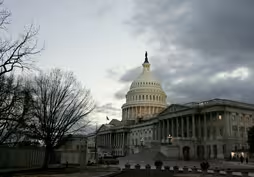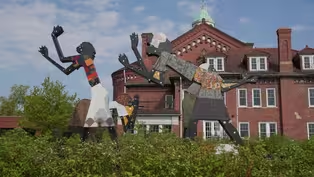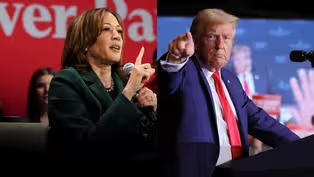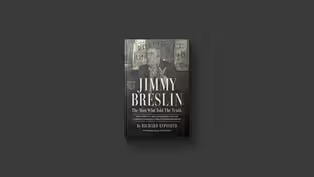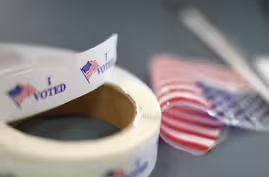
Montana primary proposal could cut down on partisan divides
Clip: 10/22/2024 | 4m 17sVideo has Closed Captions
How a Montana proposal to change its primary system could cut down on partisan divides
This November, voters in Montana will be deciding on two ballot measures that would fundamentally change voting in the state if they pass. If they pass, the state would have non-partisan primaries and a majority-winner requirement for future general elections. Stan Parker at Montana PBS reports.
Problems playing video? | Closed Captioning Feedback
Problems playing video? | Closed Captioning Feedback
Major corporate funding for the PBS News Hour is provided by BDO, BNSF, Consumer Cellular, American Cruise Lines, and Raymond James. Funding for the PBS NewsHour Weekend is provided by...

Montana primary proposal could cut down on partisan divides
Clip: 10/22/2024 | 4m 17sVideo has Closed Captions
This November, voters in Montana will be deciding on two ballot measures that would fundamentally change voting in the state if they pass. If they pass, the state would have non-partisan primaries and a majority-winner requirement for future general elections. Stan Parker at Montana PBS reports.
Problems playing video? | Closed Captioning Feedback
How to Watch PBS News Hour
PBS News Hour is available to stream on pbs.org and the free PBS App, available on iPhone, Apple TV, Android TV, Android smartphones, Amazon Fire TV, Amazon Fire Tablet, Roku, Samsung Smart TV, and Vizio.
Providing Support for PBS.org
Learn Moreabout PBS online sponsorshipGEOFF BENNETT: Voters across the country will decide the fate of 150 ballot measures this fall.
The outcomes of those elections could have profound effects on people's everyday lives, from abortion access to criminal justice to the way people vote.
One of the states deciding how future elections will work is Montana.
And that's where we start with this report from Stan Parker at Montana PBS.
STAN PARKER, Montana PBS: This November, voters in Montana will be deciding on two ballot measures that would fundamentally change voting in the state if they pass.
MAN: Vote yes in November, and we will be able to vote person, not just party.
STAN PARKER: Republican Frank Garner is a former state lawmaker and retired police chief.
Now he's helping lead Montanans for Election Reform, the bipartisan group behind the initiatives.
FRANK GARNER, Montanans for Election Reform: If you wonder why we have polarization, where we have division, why we can't solve hard problems, it has to do with the system we use to hire people for the important job of governing.
STAN PARKER: If the measures pass, the state would have nonpartisan primaries and a majority winner requirement for future general elections.
Not everyone is on board, including fellow Republicans like state party Chairman Don Kaltschmidt.
DON KALTSCHMIDT, Montana Republican Party Chair: We have a great system right now.
If it isn't broke, don't fix it.
STAN PARKER: For more than 100 years, Montana has held separate primary contests for each party.
But under one of the proposed amendments, everyone running for office would go on the same primary ballot, and then the top four vote winners in each race, no matter their party, would go on to the general election.
Implementing a top four system likely wouldn't diminish Republican strength in Montana's elections, but reformers say it would incentivize candidates to appeal to all voters, not just traditional primary voters, who skew more partisan.
FRANK GARNER: I can't just pay attention as a candidate to just the primary voter or just what happens in the primary.
I have to worry about the general election now because of competition too.
So I have to govern more broadly.
I have to talk to more people.
STAN PARKER: But what if three Republicans and one Democrat were running in a deep red district,and the Democrat won just because the conservative vote split three ways?
That's part of why there's a second initiative that would require a majority winner in the general election.
FRANK GARNER: And we believe that's important because it causes our representatives to have to build coalitions, govern more broadly, and to be able to say that they enjoy the support of a majority of people.
STAN PARKER: What's left undecided for now, exactly how to implement the change, whether this could result in run-off elections or ranked-choice voting, as some other states have done.
At the heart of these reforms is an attempt to lessen the role of political parties in elections and allow independent voters to have a greater voice in the process.
FRANK GARNER: You have 40 percent of Montanans, don't forget, that don't identify with a party.
Those people feel completely disaffected by our current voting system.
STAN PARKER: Critics like Don Kaltschmidt want to see the party system stay.
DON KALTSCHMIDT: The Republican Party has their platform.
The Democrats have their platform.
The Libertarians have their platform.
I think all of us need to look at, which one do we mostly identify with?
And that has been a system that's worked very, very well in our state and we have had great representation of this.
STAN PARKER: The state Democratic Party hasn't taken an official stance on the ballot initiatives.
Former lawmaker David Wanzenried sees them as a misguided attempt to change voter behavior.
FMR.
STATE SEN. DAVID WANZENRIED (D-MT): Well, I think they're a substitute for the hard work that needs to be done, frankly.
It will be easy for us to vote for that and say, well, take care of that, now on to the next thing, and leave it up to somebody else to actually implement it, not pay attention to the details.
STAN PARKER: Garner recognizes these reforms will not be a cure-all for what he sees as the problems in politics, but thinks they are a needed first step.
FRANK GARNER: As much good as these will do, they aren't going to solve every problem, right?
We still have to have good people run.
We still have to work together to find solutions.
But, right now, we have a system that incentivizes the wrong behavior, and we have to change that fundamentally.
STAN PARKER: For the "PBS News Hour," I'm Stan Parker in Billings, Montana.
'Click-to-cancel' would make it easier to end subscriptions
Video has Closed Captions
Clip: 10/22/2024 | 5m 55s | FTC's 'click-to-cancel' rule would make it easier to end subscriptions (5m 55s)
Democrats concentrate on N.Y. races that could decide House
Video has Closed Captions
Clip: 10/22/2024 | 7m 12s | Democrats concentrate on New York congressional races that could decide House majority (7m 12s)
Detroit's 'Little Village' gives local artists a home
Video has Closed Captions
Clip: 10/22/2024 | 7m 5s | Detroit's 'Little Village' project transforms a neighborhood and gives local artists a home (7m 5s)
Harris and Trump court Latino voters with 2 until election
Video has Closed Captions
Clip: 10/22/2024 | 3m 38s | Harris and Trump make appeals to Latino voters 2 weeks ahead of Election Day (3m 38s)
Israeli strikes put Lebanese health workers in line of fire
Video has Closed Captions
Clip: 10/22/2024 | 6m 1s | Lebanese healthcare workers caught in the line of fire from Israeli airstrikes (6m 1s)
Jimmy Breslin remembered in book as 'Man Who Told the Truth'
Video has Closed Captions
Clip: 10/22/2024 | 6m 28s | Reporter Jimmy Breslin remembered in new biography as 'The Man Who Told the Truth' (6m 28s)
State measures may have national impact by boosting turnout
Video has Closed Captions
Clip: 10/22/2024 | 4m 8s | A look at the state measures that could have national impact by boosting election turnout (4m 8s)
Providing Support for PBS.org
Learn Moreabout PBS online sponsorship
- News and Public Affairs

FRONTLINE is investigative journalism that questions, explains and changes our world.

- News and Public Affairs

Amanpour and Company features conversations with leaders and decision makers.












Support for PBS provided by:
Major corporate funding for the PBS News Hour is provided by BDO, BNSF, Consumer Cellular, American Cruise Lines, and Raymond James. Funding for the PBS NewsHour Weekend is provided by...

